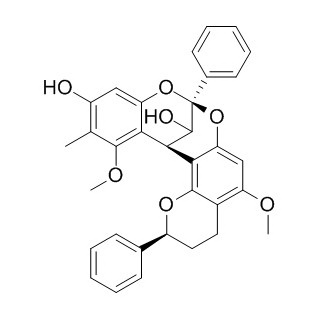Dracoflavan B2
Dracoflavan B2 is a natural product from Daemonorops draco.
Inquire / Order:
manager@chemfaces.com
Technical Inquiries:
service@chemfaces.com
Tel:
+86-27-84237783
Fax:
+86-27-84254680
Address:
1 Building, No. 83, CheCheng Rd., Wuhan Economic and Technological Development Zone, Wuhan, Hubei 430056, PRC
Providing storage is as stated on the product vial and the vial is kept tightly sealed, the product can be stored for up to
24 months(2-8C).
Wherever possible, you should prepare and use solutions on the same day. However, if you need to make up stock solutions in advance, we recommend that you store the solution as aliquots in tightly sealed vials at -20C. Generally, these will be useable for up to two weeks. Before use, and prior to opening the vial we recommend that you allow your product to equilibrate to room temperature for at least 1 hour.
Need more advice on solubility, usage and handling? Please email to: service@chemfaces.com
The packaging of the product may have turned upside down during transportation, resulting in the natural compounds adhering to the neck or cap of the vial. take the vial out of its packaging and gently shake to let the compounds fall to the bottom of the vial. for liquid products, centrifuge at 200-500 RPM to gather the liquid at the bottom of the vial. try to avoid loss or contamination during handling.
Nat Commun.2023 Dec 20;14(1):8457.
Biomolecules.2024, 14(10):1257.
Planta Med.2024, 2328-2750
Processes2021, 9(1), 153;
Molecules.2022, 27(19):6651.
Microchemical Journal2023, 194:109249
Animals (Basel).2024, 14(20):2990.
Food Chem.2024, 458:140201.
Reprod Toxicol.2020, 96:1-10.
SCOPUS.2020, 836-847.
Related and Featured Products
J Nat Prod. 1997 Oct;60(10):971-5.
Constituents of Dragon's Blood. 5. Dracoflavans B1, B2, C1, C2, D1, and D2, new A-type deoxyproanthocyanidins.[Pubmed:
9358637]
METHODS AND RESULTS:
From Dragon's Blood, a resin produced by plants of the genus Daemonorops (Palmae), six new A-type flavanoid deoxyproanthocyanidins(Dracoflavan B1, Dracoflavan B2, Dracoflavan C1, Dracoflavan C2, Dracoflavan D1, and Dracoflavan D2, new A-type deoxyproanthocyanidins.) have been isolated.
CONCLUSIONS:
Their structure and stereochemistry, established by chemical degradation and extensive NMR analysis, is consistent with a mechanism of formation common to other constituents of the resin, which involves oxidation of a 6-methylflavan to a quinonemethide, followed by coupling with another flavan moiety.



